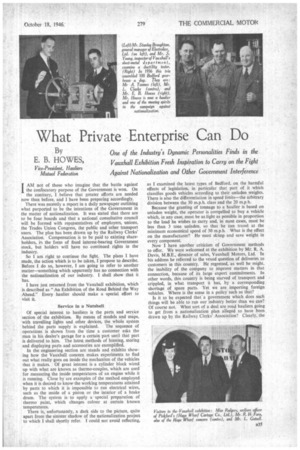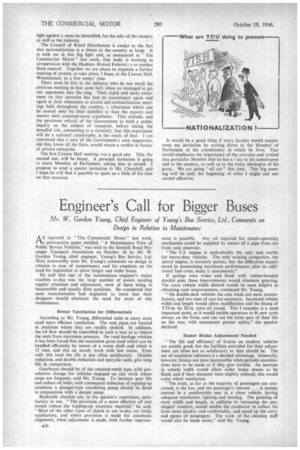What Private Enterprise Can Do
Page 41

Page 42

If you've noticed an error in this article please click here to report it so we can fix it.
By E. B. HOWES,
Vice-President, Hauliers Mutual Federation
One of the Industry's Dynamic Personalities Finds in the Vauxhall Exhibition Fresh Inspiration to Carry on the Fight Against Nationalization and Other Government Interference
IAM not of those who imagine that the battle against the confiscatory purpose of the Government is won. On the contrary, I believe that greater efforts are needed now than before, and I have been preparing accordingly.
There was recently a report in a daily newspaper outlining what purported to be the intentions of the Government in the matter of nationalization. lt was stated that there are to be four boards and that a national consultative council will be formed with repusentatives of employers, unions, the Trades Union Congress, the public and other transport users. The plan has been drawn up by the Railway Clerks' Association. Compensation is to be paid to existing shareholders, in the form of fixed interest-bearing Government stock, but holders will have no continued rights in the industry.
So I am right to continue the fight. The plans I have made, the action which is to be taken, I propose to describe. Before I do so, however, I am going to refer to another matter—something which apparently has no connection with the nationalization of our industry. I shall show that it has.
I have just returned from the Vauxhall exhibition, which is described as "An Exhibition of the Road Behind the Way Ahead." Every haulier should make a special effort to visit it.
Service in a Nutshell
Of special interest to hauliers is the parts and service section of the exhibition. By means of models and maps, with travelling lights and other devices, the whole system behind the parts supply is explained. The sequence of operations is shown from the time a customer asks the man in his dealer's garage for a certain part until that part is delivered to him. The latest methods of binning, storing and displaying parts and accessories are exemplified.
In the engineering section are stands and exhibits showing how the Vauxhall concern makes experiments to find out what really goes on inside the mechanism of the vehicles that it makes. Of great interest is a cylinder block wired up with what are known as thermo-couples, which are used for measuring the inside temperatures of an engine while it is running. Close by are examples of the method employed when it is desired to know the working temperatures attained by parts to which it is impossible to run electrical wires, such as the inside of a piston or the interior of a brake drum. The system is to apply a special preparation of thermo paint, which changes colour at certain known temperatures.
There is, unfortunately, a dark side to the picture, quite apart from the sinister shadow of the nationalization project to which I shall shortly refer. I could not avoid reflecting, as I examined the latest types of Bedford, on the harmful effects of legislation, in particular that part of it which classifies goods vehicles according to their unladen weights. There is also the differentiation in speed limits—the arbitrary division between the 30 m.p.h. class and the 20 m.p.h.
Because the granting of tonnage to a haulier is based on unladen weight, the operator is compelled to buy a vehicle which, in any case, must be as light as possible in proportion to the load he wishes to carry and, in most cases, must be less than 3 tons unladen, so that he can travel at the minimum economical speed of 30 m.p.h. What is the effect on the manufacturer? He must skimp and save weight in every component.
Now I have another criticism of Government methods to offer. We were welcomed at the exhibition by Mr. R. A. Davis, M.B.E., director of sales, Vauxhall Motors, Ltd. In his address he referred to the vexed question of deliveries to customers in this country. He regretted, as well he might, the inability of the company to improve matters in that connection, because of its large export commitments. In other words, this country is being starved of transport and crippled, in what transport it has, by a corresponding shortage of spare parts. Yet we are importing foreign vehicles. Where is the sense in a policy such as that?
Is it to be expected that' a government which does such things will be able to run our industry better than we can? Of course not. What sort of a deal are road hauliers going to get from a nationalization plan alleged to have been drawn up by the Railway Clerks' Association? Clearly, the tight against it must be intensified, for the sake of the country as well as the industry.
The Council of Retail Distributors is awake to the fact that nationalization is a threat to the country at large. It is with me in this big fight and, as announced in " The Commercial Motor" last week, that body is working in co-operation with the Hauliers Mutual Federaten to combat State control. Together we are about to organize a further meeting of protest, to take place, I hope, at the Caxton Hall, Westminister, in a few weeks' time.
There must be few in the industry who do not recall the previous meeting in that same hall, when we managed to get our opponents into the. ring. Their rapid and early retirement on that occasion has had its counterpart again and again in their reluctance to attend anti-nationalization meetings held throughout the country, a reluctance which can be caused only by their inability to face the experts and answer their common-sense arguments. That attitude, and the persistent refusal of the Government to hold a public inquiry on the subject of transport, before taking the dreadful risk, amounting to a certainty, that this experiment will be a national catastrophe, is the result of fear. I am convinced that a jury of the Government's own supporters, did they know all the facts, would return a verdict in favour of private enterprise.
1 he first Caxton Hall meeting was a good one. This, the second One, wilt be better. A personal invitation is going to every Member of Parliament, asking him to attend. I propose to send a special invitation to Mr. Churchill, arid 1 hope he will find it possible to spare us a little of his time on that occasion. It would be a good thing if every haulier would supplement my invitation by writing direct to the Member of Parliament ot the constituency in which he lives. That would emphasize the importance of the occasion and remind that particular Member that he has a Cully to his constituents and to the country, as well as to the fancy ideologies of his party. We are going "all cut" this time. This big meeting will be only the beginning of what I might call our second offensive.












































































